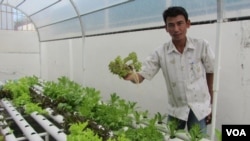Much of Cambodia’s farming takes place as it has for eons—flooded rice field, mud, water buffalo, plow. But these days, there’s a modern way to farm, one that doesn’t even require soil: hydroponics. And Mann Sophal is one of the few people in the country who knows how its done.
At his home outside Phnom Penh, Mann Sophal grows cabbage, lettuce and tomato, all without soil. In his greenhouse, the crops are suspended in a small amount of water, jutting from holes in elevated plastic piping.
The vegetables are safer and healthier, he says, and fetch more money at market.
Hydroponic farming requires a greenhouse, pipes, sponges, plastics, fertilizer and equipment to test the water. The sponges hold the seeds, which are placed in small baskets after they sprout. Water is cycled through the pipes as the plants grow. In about 45 days, Mann Sophal has his crop.
“The vegetables are sensitive to hot temperatures,” he says. “So we have to build a roofed structure, covered by plastic, to reduce the temperature by 30 percent, and we need to put netting around the building to prevent insects from eating the vegetables.”
Mann Sophal says hydroponic farming is easier than traditional farming, but it does require some know-how about the equipment and the water. The small tubes mean water is constantly checked for temperature, alternating between warm and cold, “so the vegetables can grow well,” he says.
Mann Sophal says he uses water infused with tobacco as a pesticide, but he’s able to harvest about 100 kilograms of vegetables per month. He sells them for about $3 per kilogram, and his profits come to about $250 per month. The vegetables go to restaurants and individual customers—mostly foreigners, he says.
Food vendor Penh Chanmarina says she doesn’t mind paying more for Mann Sophal’s crops. She buys about 50 kilograms per month, or half his crop. “The price of hydroponic vegetables is a bit more expensive than normal vegetables, but we can be certain there are no chemical substances that affect consumer health,” she says.
Mann Sophal says hydroponic farming is suitable for anyone with a small growing area, even if they have another job. He knows at least 10 families who are trying it, and other people have asked him about the technique.
But it’s an open question whether his neighbors and countrymen will adopt the technique, in a country where traditional farming is, well, the tradition.







